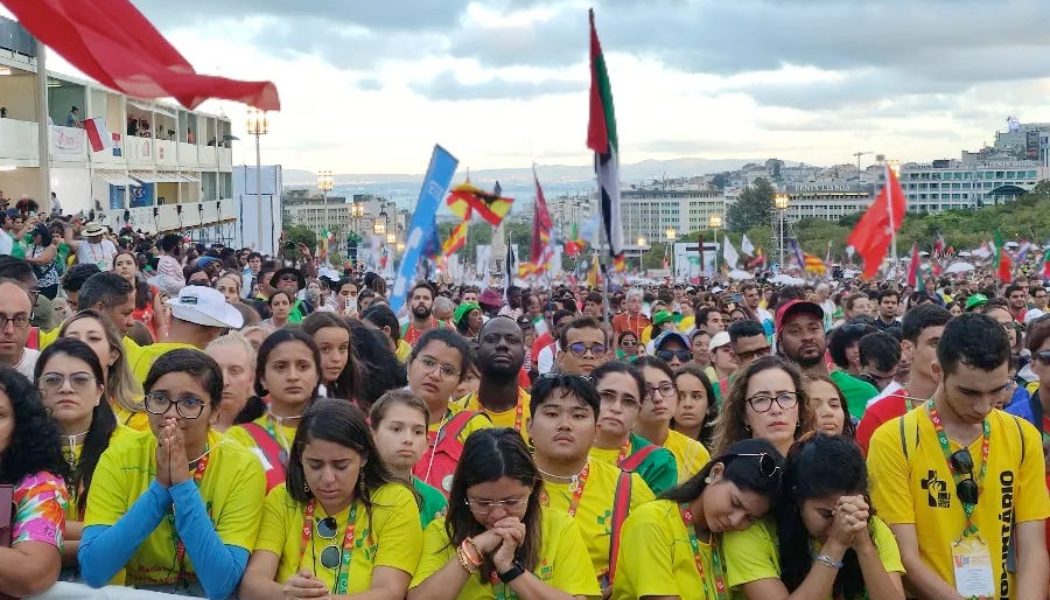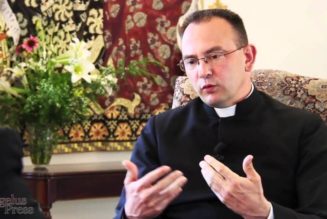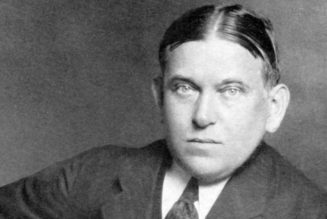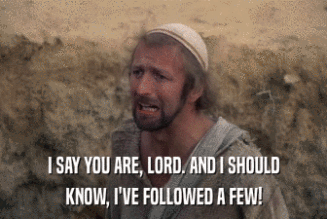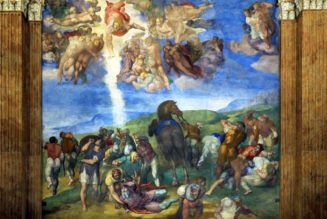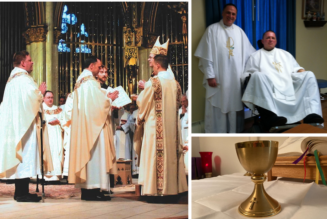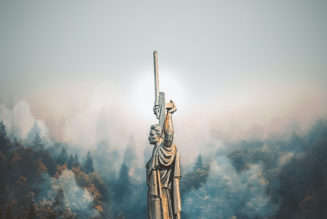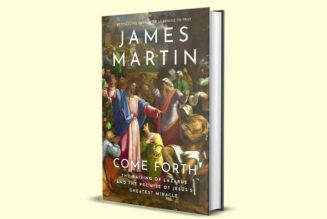Happy Friday friends,
World Youth Day is in full swing in Lisbon and while pretty much my whole family is over there, JD and I spent much of the week at a canon law conference, catching up with colleagues, classmates, and old friends.
I don’t mind telling you, getting to spend two days swapping tribunal stories and arguing in the bar over the finer points of procedural law is my idea of a vacation — or the closest I’m coming to one this summer, anyway.
That said, I do wish I’d been able to make it to Lisbon. As a younger man, I remember World Youth Days in places like Toronto as moments of great gift for my life in the faith, and the chance to hear the pope(s) speak to us as young people was formative in many ways.

There are arguments and criticisms of the events this week, to be sure.
I’ve seen people complaining that this or that speaker is an unbearable conservative or dangerous liberal. And there is the usual concern (sometimes outrage) at the distribution of Communion at the mass-scale Masses.
But these are, I think, par for the course. WYD Denver, 30 years ago now, is widely credited as the genesis of a generation of Catholic renewal in the United States, but it’s worth remembering the event was mired in controversy at the time over things like a mime troupe stations of the cross led by a lady Jesus.
There’s always something for everyone to get angry about at WYD, but, I think rather more importantly, there are also countless experiences of faith, moments of conversion, and times of profound communion and beauty. It is, in this sense, an excellent encapsulation of the life of the Church.
My personal perennial gripe is how organizers are always banging on about the “hopes and dreams” of young people.
I find the language somewhat patronizing, insipid, and unserious. Youth is a time of idealism, for sure. But I find the whole “hopes and dreams” thing to be rather trivializing in a felt banner kind of way, as though anyone under 30 cannot articulate a vision more specific or a need more particular than world peace.
When I went to World Youth Days, I was deeply preoccupied with discerning my vocation and asking the Holy Spirit what God wanted of me in my life, and lucky enough to have catechists concerned with encouraging me in those reflections.
In my experience with “young people,” with and for whom I help with a monthly Bible study and adoration, their problems and concerns are all too real, and their ambitions and aspirations desperately keen.
Those burning inner desires are what they bring to Lisbon, and to every World Youth Day, and they don’t tend to write well on a cardboard dove or read nicely on a display board.
The great advantage of youth is that they can hear a prophetic calling, as I and so many of my generation did when John Paul II urged us not to be afraid, to be saints, and to respond not with cynicism but with sincere belief that all things are possible in Christ.
Fires of faith are being kindled at Lisbon, as they were in Denver, and Paris, and Galilee, Toronto, and Rome, and Cologne, and Rio.
I wish I were there. And if I were, my “hope” would be that the Gospel would burn again in me, as it did when I was young.
The News
With a week of events in Lisbon, our correspondent on the ground, Filipe d’Avillez, has become the go-to guy to follow everything that is happening.
This morning, Pope Francis told pilgrims that God is calling them by name.
Filipe has filed a daily news diary on who is doing what, where, and with whom he has been speaking.
He’s also got to the bottom of issues like how all the hosts for the big outdoor Masses were consecrated and distributed, something about which there was a lot of online conjecture but little real reporting for people to read.
—
Filipe has also been reporting out longer stories on the background to WYD, like this report on the once blighted neighborhood of Serafina, visited by Pope Francis this week.
Serafina still has its problems, but for decades it was a virtual no-go area, with even police simply refusing to go there. But things have changed for the better, largely due to the positive influence of one parish — which Francis visits today.
Read all about it, and how one priest lives what he calls the “evangelization of charity.”
—
Among the many pilgrims who have streamed to Lisbon from across the world came the entire presbyterate of the kingdom of Bhutan.
Filipe caught up with him, too, and discussed how in a country with no Christian history or symbols or visible presence of the Church, his conversion began when he saw a stray Christmas card and wondered what it was.
This is a story of faith and conversion and sincere joy in the Lord.
That’s what World Youth Day is all about, Charlie Brown.
—
The Church in Iraq is in the midst of a crisis, after the country’s president revoked a decree recognizing the Patriarch, Cardinal Sako, as head of the Chaldean Catholic Church.
This recognition isn’t a matter of courtesy in the land where the 600,000-strong Church has been present, and under persecution, for millennia — it carries with it a host of legal effects, including rights over the Christian community’s holding in Iraq.
Sako fled the ancient see of his Church in Baghdad for the autonomous region of Kurdistan and in a letter this week set out the conditions for his return to the capital, while denouncing the president and militia’s actions against him and the Church’s interests.
I strongly urge you to read the letter, and to pay attention to this unfolding crisis.
—
After Cardinal Sako released his letter, he spoke to our own Luke Coppen about the crisis in Iraq.
“I am not afraid at all. I am a consecrated person. I am ready to give up my life for the Church of Christ and my homeland,” he told Luke.
This is a conversation with the head of an ancient Catholic Church, a cardinal, living in exile in his homeland and fighting for the freedoms of the faith and his hopes for his country. This matters.
—
Away from the fascinating evidence of financial shenanigans, I think the most interesting thing we have actually learned from the Vatican trial is that the Holy See seems to be a hotbed of private espionage.
The court case is, as we all know by now, superficially about money — who stole it, from whom, how, and where it went. But, as I wrote this week, it has really become about something much more fundamental: the rule of law in Vatican City, or its absence.
Leaving aside the international property deals for a second, it’s worth considering the copious testimony the court has heard about rival Vatican officials’ use of private intelligence networks, illegal wiretaps, outside contractors, and parallel power structures.
For the most part, those involved haven’t denied any of this — in fact, they’ve willingly admitted to it and, in some notable cases, insisted they would do it all again.
None of these actions are the subject of current criminal charges, and in the notable case of Archbishop Edgar Peña Parra, the sostituto at the Secretariat of State, he remains in office despite freely telling the court about how he appears to have abused it with impunity.
Let me put this as bluntly as I can — the number three official in the Vatican has admitted to illegal wiretaps and to contracting off-duty Italian government intelligence agents to run private investigations for him and no one seems to care.
In the short term, I think that is kind of a big deal — it says a lot about the rule of law in the Vatican that such a senior figure can flout it in front of a panel of judges without consequences.
In the long term, it suggests to me that even if the current case ends with convictions — even big-name convictions — the culture of private agendas and rival power bases which caused this scandal remains securely intact. That being the case, history is bound to repeat itself.
You can read my whole analysis here.
You can say ‘I do’, but you don’t
Bishop Howard Hubbard, the emeritus of Albany, announced two things this week.
You can read the whole story here, but the basic details are this:
As we first reported last year, Hubbard, who retired in 2014, asked Rome for laicization in November.
At the time, he claimed it was because of restrictions placed on his ministry as a priest and bishop by his former diocese — he’s the subject of several lawsuits including allegations of personal sexual abuse of young men and his admitted actions to move abuser priests in ministry as bishop.
The Diocese of Albany rejected his claims that they had restricted his ministry.
The Pillar reported independently that Hubbard was actually seeking to get married to a woman several decades his junior. Howard is 84.
Rome, according to Hubbard, rejected his request to be laicized and told him to wait until the several open lawsuits against him were settled. He was not disposed to wait, so he went for a courthouse wedding late last month.
Hubbard’s attempted civil marriage is invalid, of course, because he remains subject to his clerical obligation of celibacy, which impedes his freedom to contract marriage.
There’s been a little confusion about this since our reporting, so I just want to straighten it out as a matter of Church teaching, canon law, and natural law.
Yes, the state of New York (probably, I’m still hunting for a copy of the marriage license) considers Hubbard to be married. But there are not different kinds of “marriage” — sacramental marriage, civil marriage, natural marriage, and whatever other categories you want to come up with.
There is marriage, full stop. It was created by God and is a function of the natural law in which a man and a woman are joined in a partnership of the whole of human life for the good of the spouses and the procreation and education of offspring.
That’s marriage. All marriages.
When two baptized Christians marry, their marriage is a sacrament because, the Church teaches, Christ himself raised marriage between Christians to the dignity of a sacrament and imbued it with grace. That is an immense gift for Christian spouses, but it did not reinvent marriage, or create a new kind of marriage.
Two Christians’ sacramental marriage is not categorically different to a Christian married to a non-Christian, or two non-Christians who are married to each other. None of those couples are more or less married than the others and, because marriage is a function of the natural law, the Church has the authority to judge the validity of all of them — ask a canonist and they’ll tell you tribunals get cases involving non-sacramental unions all the time.
Yes, the Church recognizes that the civil government has an interest in the regulation of marriage and even the right to do so — so long as it acts within the confines of and not against the natural law (insert your argument about Obergefell here).
But the state does not define marriage, and it does not create a different category of marriage called “civil marriage” as opposed to “sacramental marriage.” It just recognizes marriages and via that recognition confers certain civil effects. And it can, as in Hubbard’s case, get it wrong and recognize someone as married who, in fact, is not.
That’s the key point I want to make here: marriage, as a product of the natural law, is not a creation of the state or the Church, it exists independent of either and predates both.
Anyway, Howard knows all this. And he knows he is not actually married. But he also knows that when a cleric — be it a deacon or priest or bishop — petitions Rome for the favor of laicization, he might not get it.
But if a cleric outrages the public decency by, for example, attempting to contract marriage even in the civil forum, the Vatican might well move quickly to impose laicization as a penalty to repair the public scandal.
That’s what’s going on here, in all likelihood. Having been told “no,” Bishop Hubbard is trying to provoke Rome into laicizing him by creating a scandal. And it may work — I know many instances of priests who have tried the same wheeze as they seek to leave ministry.
But it doesn’t mean Hubbard is married in the meantime, and it doesn’t mean he’s “won” if his plan works. This is about the state of his soul as much as his marriage, after all.
So pray for Bishop Hubbard. But don’t mistake him for a married man.
You won’t read it here
There is, I am sure you have noticed, a lot going on in American politics right now. Specifically in the race to secure the Republican presidential nomination for next year’s election.
In the last week, I’ve seen and been told about prominent pro-life organizations trading shots with Ron DeSantis over his commitment to a federal abortion ban, and been asked about former VP Mike Pence’s turn as a speaker at a California conference for Catholics.
I’ve been asked more than once why we haven’t covered these things at The Pillar, and there are a couple of reasons.
For me personally, I think this is all so much political kabuki. Neither DeSantis nor Pence, nor anyone else who isn’t named Donald Trump, is polling within two parallel universes of the nomination.
So devoting time and space to covering the noises off from the peripheral characters strikes me as simple theater or a bid for attention.
For The Pillar professionally, we simply don’t have anything original to add to these things in terms of reporting or analysis — and we don’t do political commentary.
My own personal prediction is that trials and even convictions notwithstanding, Trump will win the Republican nomination. And when he does, all the same professional lobby groups who more-or-less grudgingly (or enthusiastically) backed him before will back him again. That’s literally their business.
Most, if not all, Catholic media outlets (but definitely not The Pillar) will make an explicit or implied endorsement of Trump or Biden in an editorial or “publisher’s note,” maybe even with some hand-wringing about neither choice being exactly ideal.
Maybe those positions will be the fruit of sincere conviction, maybe they will be the byproduct of taking large amounts of money from said lobby groups and/or their major donors.
Maybe it’s all that, plus the desire to appear “on the team” with the right cultural tribe, in and out of the Church, and to make sure you reap the benefits, hard and soft, that come with that status.
I don’t know. Who can plumb the depths of the human heart?
For me, it’s this simple: Neither Trump nor Biden is a candidate who will run on a platform that isn’t somewhere at odds with basic Catholic moral teaching.
You can, as I usually do, conclude that neither is therefore worthy of your vote and cast it accordingly. Or you can do your best to inform your conscience and make your own assessment of the relative merits and consequences of supporting one or other of the candidates. Both are totally valid options, and I’m not here to tell anyone how to vote.
What you cannot do is speak prophetically by arguing for the lesser of two evils. They are simply two different things. Speaking prophetically means announcing and defending the true, the good, the beautiful. It means proclaiming the perfect and the best — what God calls us all to reach for. The subjective, the regrettable, the ugly, those all have their place in our reality, but no prophet ever said “if you have to choose, go with Ahaziah over Ahab.”
So if the invitation is to pick a side and back the guy, whichever guy and whatever his faults, then no thanks. That ain’t me, and that’s why I work here.
See you next week,
Ed. Condon
Editor
The Pillar
Comments 25
Services Marketplace – Listings, Bookings & Reviews
